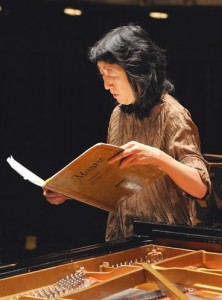Mitsuko Uchida, Royal Festival Hall (Review)
 The magic usually descends quickly in a Mitsuko Uchida recital but the opening Bach of this rescheduled Festival Hall concert – a pair of Preludes and Fugues from Book 2 of The Well-Tempered Klavier – took a while to draw attention from the farthest reaches of this unfriendly recital space. Could it be that the Prelude of the C major Prelude and Fugue was too assertive, strident even (not a word one normally ever associates with Uchida), or that the, to my mind, inappropriate rubato somehow disturbed the perfect equilibrium of the music? The opening of the F sharp minor Prelude settled the uneasiness and through its fantasy concentrated our hearing and our minds. The bird of paradise (so suggestive of Uchida’s diaphanous turquoise top) began to emerge.
The magic usually descends quickly in a Mitsuko Uchida recital but the opening Bach of this rescheduled Festival Hall concert – a pair of Preludes and Fugues from Book 2 of The Well-Tempered Klavier – took a while to draw attention from the farthest reaches of this unfriendly recital space. Could it be that the Prelude of the C major Prelude and Fugue was too assertive, strident even (not a word one normally ever associates with Uchida), or that the, to my mind, inappropriate rubato somehow disturbed the perfect equilibrium of the music? The opening of the F sharp minor Prelude settled the uneasiness and through its fantasy concentrated our hearing and our minds. The bird of paradise (so suggestive of Uchida’s diaphanous turquoise top) began to emerge.
And then – miraculously – the space was diminished and our ears and emotions were fine-tuned through the extreme intimacies of Schoenberg’s Six Little Pieces Op.19. “Little” is a big word here because in these astonishing miniatures there is a world of expression in microcosm. Big ideas, big emotions, are simply concentrated into fleeting moments where every note is not just crucial but startlingly resolute and resonant. It was amazing how Viennese they sounded under Uchida’s fingers – tiny lyric phrases were rendered almost luxuriant; the germination of piquant dances were ländlers waiting to happen. In the sixth and final piece one might have asked for whom the distant bells tolled. But it was for Mahler.
The rest of the evening was devoted to the great Schumann. First there were the “forest murmurs” of Waldszenen where the voices of lost children seemed permeate every episode. There are more dances here – transfigured dances – and they are strange, distracted, ethereal, and oblique, only occasionally asserting themselves in fully primary colours. Uchida was mindful always of the “disturbances” within these pieces leaning into the hurtful dissonances and twinges of anxiety. The famous “Vogel als Prophet” (“Bird as Prophet”) sequence was Uchida at her finest, the consoling chorale emerging transcendently from this extraordinary dusk chorus.
The Second Sonata in G minor seemed almost to overwhelm Uchida at times – which is precisely the feeling one expects from it. So much of this piece is tempestuous, impassioned to the point of hectoring, but at the heart of it is a songful slow movement where Uchida’s sense of the voice shone through a myriad accompanying details.
The playing by now had grown so aware, so exquisitely modulated, that arriving at Gesänge der Frühe (“Songs of the Dawn”) seemed beyond inevitable. How perceptive of Uchida to close her recital not with the sonata but with this “edge of reason” masterpiece penned only months before Schumann’s catastrophic breakdown. And how ironical its overriding lucidity, only those hurtful dissonances and the occasional perilous peak belying a profound unease. The opening piece had to be heard to be believed – a chordal sequence so subtle in its movement (and in Uchida’s peddling) that complete stillness prevailed.
Uchida gave only one encore – and a little shake of the head at the keyboard suggested a momentary, and quite charming, uncertainty as to what she might play. It was Mozart and it was so perfect that there was nothing more to be said.
You May Also Like

GRAMOPHONE Review: Heggie – It’s A Wonderful Life
06/12/2017
A Conversation With PATRICIA HODGE
09/02/2015